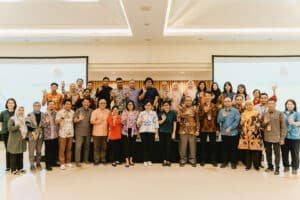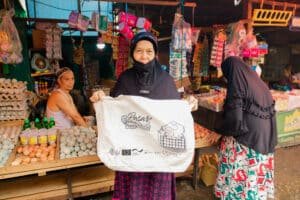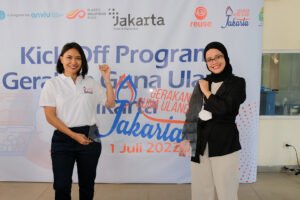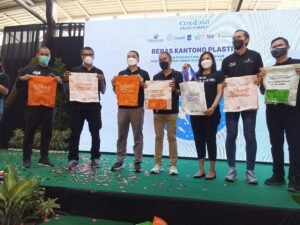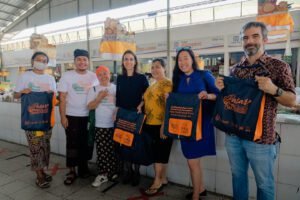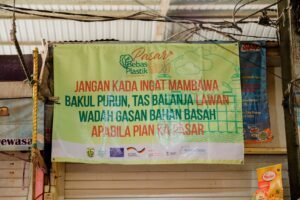Jakarta, 26 April 2022 – Four markets in Bandung and Banjarmasin have completed a plastic-free pilot market trial program, which began in February 2021. As a result, Kosambi and Cihapit Markets in Bandung reduced the use of single-use plastic bags by 11% and 19%, respectively. Apart from that, there was a similar decline at Pekauman and Pandu Markets in Banjarmasin, reaching 18% and 27%, respectively.
Another positive result achieved by this program is a change in the behavior of market visitors. Shoppers carrying environmentally friendly shopping bags in these four markets increased by 21%. More than 600 traders in these markets received training on how to make plastic-free transactions with their customers.
The implementation of the Plastic Free Market trial is a collaboration between the Indonesian Plastic Bag Diet Movement (GIDKP) and the local city government. This program supports the Minister of Environment and Forestry (LHK) Regulation No. 75 of 2019 concerning the Roadmap for Waste Reduction by Producers.
“The Plastic Free Market trial in Bandung and Banjarmasin broke the stigma that traditional market buyers and traders still struggle to relinquish their dependence on single-use plastic. “I hope that the positive results of this program will inspire other traditional markets to immediately free themselves from plastic and make Indonesia Clean Waste 2025 a success,” said Ujang Solihin Sidik, Head of the Sub-Directorate for Producer Management, Directorate of Waste Reduction, Ministry of Environment and Forestry.
The Plastic Free Market trial program specifically targets traditional or people’s markets. Based on research conducted by GIDKP, people’s markets are one of Indonesia’s most significant sources of plastic waste. As many as 416 million pieces of plastic bags are produced in one year by people’s markets alone, or around 45% of all plastic bag sources (apart from shopping centers, modern shops, and restaurants)
Tiza Mafira, Executive Director of the Indonesian Plastic Bag Diet Movement, stated: “Traditional markets are inhabited by hundreds or even thousands of informal sector traders. An individual also owns the kiosk. The inventory system is also not centralized, so buyers can still request multiple uses of plastic. “Our strategy is to approach traders so that behavioral changes initiated by traders can reduce the giving of plastic bags.”
“Not only providing environmentally friendly bags, this program aims to understand the characteristics of traders and market visitors so that we can find long-term solutions to reduce plastic waste. Reducing the use of plastic bags not only helps the environment but also reduces Bandung city waste to landfills. “It also helps traders in the market save an average of IDR 300,000/month,” said Deti Yulianti, Young Expert Environmental Impact Controller, Sub-Coordinator of Operational Technical Cooperation, Bandung City Environmental Service.
“Most traders already understand that the use of plastic is dangerous. However, they have not found alternative packaging for wet commodities. Through this program, together with GIDKP, we are actively carrying out various kinds of education, outreach, and evaluation so that traders and market visitors are more confident in reducing dependence. “This is also supported by the Mayor of Banjarmasin, who appealed to the community to reduce single-use plastic waste. We will continue to evaluate in the future,” said Dwi Naniek Muhariyani, Head of Environmental Management at Banjarmasin City Environmental Service.
With the completion of the Plastic Free Market trial program in these two cities, GIDKP will bring the learning results to other traditional markets and focus on developing more economical, easy-to-maintain container prototypes that can be reused for various commodities.
“The next challenge is more support to ensure continued achievements in these four markets. This trial has proven that reducing plastic waste in traditional markets is possible. We still have a lot of homework to do because there are more than 16,000 traditional market units in Indonesia. “With good support, regulations, and supervision, let’s create a Plastic Free Market together,” concluded Tiza.
This Plastic Free Market Program is supported by the ‘Rethinking Plastics – Circular Economy Solution to Marine Litter’ Project from the European Union and the Government of the Federal Republic of Germany and implemented by the Deutsche Gesellschaft für Internationale Zusammenarbeit GmbH (GIZ) in Indonesia.
******************
About GIDKP
The Indonesian Plastic Bag Diet Movement (GIDKP) is a non-profit organization incorporated as an association that has received various awards for its efforts to realize a single-use, plastic-free Indonesia. By taking an advocacy, collaboration, and education approach, GIDKP has encouraged more than 70 cities/districts to ban single-use plastic.
GIDKP initiated the “Not Free Plastic Bags” (#Pay4Plastic) trial in 2016 throughout Indonesia with the Ministry of Environment and Forestry, which reduced plastic bag consumption by up to 55%.
GIDKP has received various awards, including the Mental Revolution Award from the Indonesian Government (2019) and the UN Ocean Hero 2018 appreciation from the UN. GIDKP’s activities were also covered in two documentary films, The Story of Plastic (2019), which won the Emmy Awards, and Pulau Plastik (2021).









